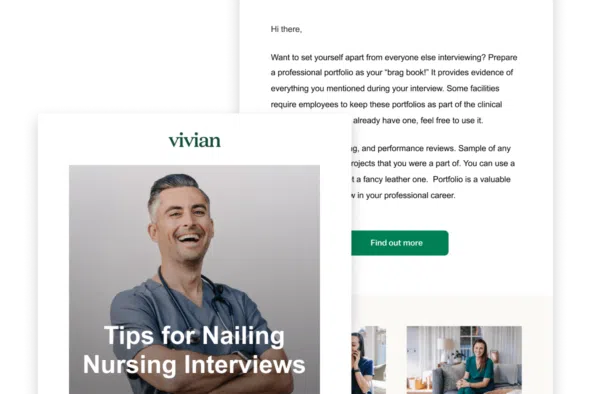Being a travel nurse can be a lucrative career, and it’s one that’s more suited for some nurses than others. Obviously, travel work requires you to be away from home for long periods of time, which can separate you from friends, family and your routine. The job also requires a certain level of organization, flexibility and professionalism as you deal with continually changing work environments.
Do you think travel nursing jobs may be a fit for you? Take our quiz to find out. Simply keep track of the number of A, B and C responses you select below and then see how your answers rate at the end of the quiz.
Travel Nursing Compatibility Quiz
1. After working on a med/surg floor for nearly a year, you find out you’ve been scheduled to cover post-op for a co-worker going on maternity leave. How do you react?
- A. You’re happy to help out and welcome the opportunity to learn new skills.
- B. You’re not thrilled about the short notice, but decide to make the best of it.
- C. You’re a bit intimidated by the new people and processes you’ll have to learn.
2. Your hospital system just announced the rollout of a new EHR/EMR. You consider yourself an expert at charting in the current system. What’s your initial response?
- A. I’ll become an expert in the new system, too.
- B. I’m not sure the new EHR/EMR is a good thing yet; we’ll see.
- C. I don’t want to spend time learning a new system that makes my job harder.
3. Your patient’s family is upset by the new care plan and demands to know why it changed. How do you approach them?
- A. You gather your thoughts and pertinent information and calmly explain the situation.
- B. You didn’t expect this today, but address it swiftly so you can get back to work.
- C. You defer to your shift manager because this function should really fall on them.
4. The on-call physician you rang at 2 AM for a patient’s medication change gets short-tempered and lashes out at you. What’s your reaction?
- A. You calmly apologize for the inconvenience and explain that you are following proper approval protocol.
- B. After some thought, you confer with your supervisor and determine that you made the right decision.
- C. You take it personally and feel bad for the rest of your shift, hoping no one asks what happened.
5. Severe weather has caused an influx of ED patients at the same time as a power outage and system interruption. How does your attitude change?
- A. You rely on your triage training to evaluate patients and follow specific hospital protocols.
- B. You look to your colleagues for guidance and manage to make the best of the situation.
- C. You are thrown for a loop and have some difficulty adjusting to the sudden chaos.
6. While working OT on the day shift, you’re surprised by the different personalities on this team and aren’t sure how you’ll fit in. How do you cope?
- A. You make an effort to ask questions and take direction from others so you can work effectively as a team.
- B. You seek out a few like-minded co-workers so you can get a feel for how this team functions best.
- C. You do your thing and hope that the shift goes by quickly, trying to blend in.
7. A recruiter contacts you with an opportunity to make a great wage in a travel role on the opposite coast. What’s your gut reaction?
- A. You’re excited to explore a new city, meet new people and learn new things.
- B. It is somewhere you always wanted to visit, but you’re not quite sure about spending 13 weeks there.
- C. You feel anxiety about being the new kid in town and need to give it some serious thought.
8. Your new floor manager is a real stickler for the dress code and asks you to stop wearing your favorite charm bracelets and large hoop earrings. What’s your response?
- A. You comply, knowing that the hospital dress code is in place for appropriate reasons.
- B. You don’t think it’s fair that your style is compromised but understand that patient care comes first.
- C. You disagree with the request and only remove your jewelry so you don’t lose your job.
9. How strongly do you agree with this statement? “Being on time and working scheduled shifts is essential for both me and my team.”
- A. I agree 100%, reliability is a top priority.
- B. I agree but know that sometimes things happen to cause absences.
- C. I feel like it’s okay to rearrange my schedule at times; I can always pick up OT.
10. Your facility has instituted a new protocol for changing IV tubing. After taking the required training, how easy is it for you to implement?
- A. You conscientiously refer to your notes and ask questions to ensure you’ve mastered the new procedure.
- B. You make an effort to follow the guidelines, even though the new method is more time-consuming.
- C. You prefer the old way but try to do the new method when it’s not too busy on your shift.
11. Your hospital just got acquired by a larger healthcare system and changes are sure to follow. What’s your reaction?
- A. You know it can take some work, but realize change is also an opportunity for improvements and growth.
- B. You wonder how you and your team will be affected, and wait to hear how your job will be impacted.
- C. You feel uneasy, knowing that your day-to-day routine could be upended soon.
12. You arrive for your first shift at your new travel assignment, and no one seems to know what’s going on. How do you handle it?
- A. You keep your patience, present your paperwork and reach out to your contact person to get things moving.
- B. You call your recruiter and try to figure out what to do next.
- C. You feel put out and flustered, and wait on the facility staff to sort it out.
13. Your ICU patient has been intubated and is having a hard time communicating his needs. How do you adapt?
- A. You maintain eye contact, tune in to nonverbal cues and use body language to help communicate.
- B. You rely on touchscreen communication aids and talking with family members to interpret messages.
- C. Good old pen & paper and dry-erase boards should do the trick.
14. You get a text mid-shift that your kids have spilled paint all over the living room carpet. How does this frustration affect your work?
- A. On your break, you take a brisk walk to help you relieve stress and maintain calm patient interactions.
- B. You vent to your coworkers to blow off steam, hoping they’ll understand if you’re not at your best today.
- C. You share your frustration with your patients as a way of coping with stress.
15. It’s five minutes before shift change, and your youngest patient has just gone down for emergency surgery. Her mother is in the room sobbing uncontrollably. What do you do?
- A. You take time to console the mother and show concern for her child, regardless of your own personal post-shift needs.
- B. While you empathize with the family, you excuse yourself and brief the oncoming staff so they can take over when you clock out.
- C. You make notes in the patient’s chart and head out, knowing that you have plans after work.
Rating Your Results
Think you’re ready for travel nursing? Your answers to this quiz may give you an indication of your suitability for the role. If you answered:
Mostly A’s: You possess a lot of the characteristics that make a good travel nurse. Your flexibility, communication and willingness to adapt and learn are traits that could make you well-suited for travel assignments. You should take a look at available travel nursing jobs to start the process.
Mostly B’s: You may still be getting comfortable with change or need to practice your coping skills in order to succeed as a travel nurse. You may want to connect with a travel nurse agency and recruiter to discuss your options and see if travel nursing could be a fit for you.
Mostly C’s: You’re still learning to adapt and roll with the punches, or you find coping with stress a challenge. It may benefit you to take on some local per diem jobs as a way to immerse yourself in unfamiliar work situations before taking on a travel nurse commitment.
Whether you’re a new nurse looking to the future or a seasoned nurse considering a change, Vivian Health can help you find travel nursing jobs that suit your needs. Explore our travel nurse salary guide to learn where you can earn top pay for travel nurse jobs nationwide.






I am a Certified MA, and a Medication Aide at my current place of employment. I want to be able to function at various levels, places, and to become the best Medical Assistant that I can be while learning to become a Registered Nurse.